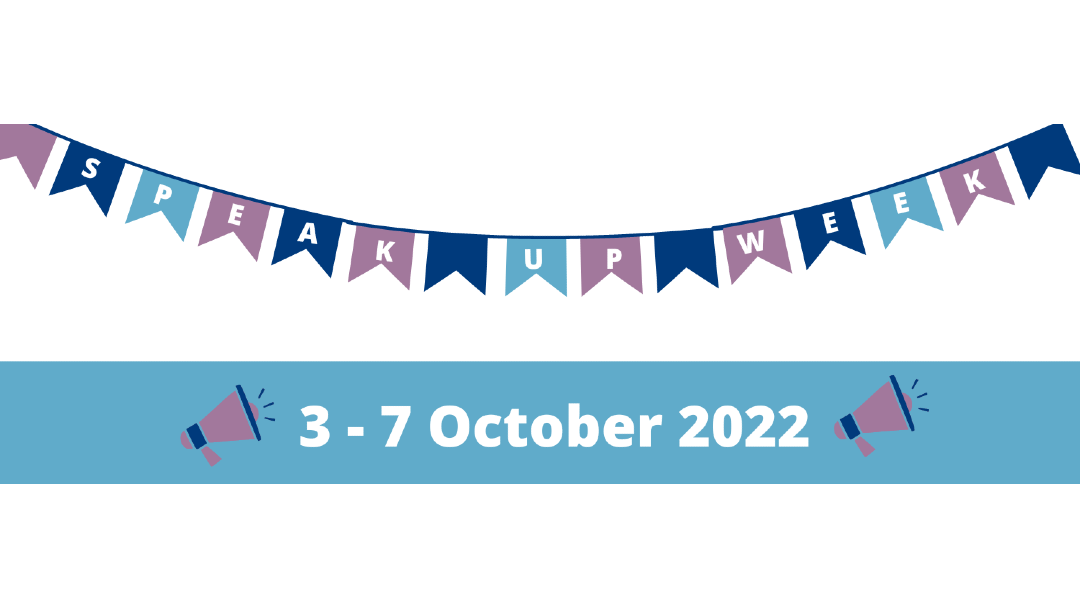Want to speak up but don’t know who to turn to?
Speak Up Week (Monday 3 – Friday 7 October) is a new initiative launched by the Independent National Whistleblowing Officer (INWO) to raise awareness about how to raise concerns and promote a positive speak up culture within the NHS.
The National Whistleblowing Standards was introduced in April 2021 to help staff raise concerns as early as possible and supporting and protecting staff when they do raise concerns, giving them confidence to raise concerns if they see something wrong.
Under the Standards, all staff have access to a ‘confidential contact’. Their role is to provide a safe space to discuss your concerns and to give you the information you need. They also have the knowledge and skills to help you to raise your concern with the appropriate manager. Staff can also raise concerns directly with their line manager or any other senior member of staff as well as by emailing uMatter@lanarkshire.scot.nhs.uk which is checked on a daily basis.
Nsenam Obot, a Specialist Radiographer at University Hospital Wishaw, is one of NHS Lanarkshire’s confidential contacts.
Nsenam said: “We would encourage staff who have concerns to speak to one of the confidential contacts. Since the introduction of the standards last year, we have had concerns raised through us that have been investigated by senior management. As a result, action plans have been developed towards improving both the working conditions for staff as well as patient care.
“They have also enabled key learning outcomes, recommendations and service improvements to be shared across departments.
“There are a number of themes that we can guide staff on, should they wish to raise concerns. From patient safety and patient care to poor practice, unsafe working conditions and abusing authority. We can discuss these issues in a safe and confidential space and offer you all the support available to you during the process.”
NHS Lanarkshire’s non-executive director and whistleblowing champion Lesley McDonald added: “The whistleblowing standards can be used to improve patient care, safety and experience as well as promoting an open, transparent and supportive working environment.
“Whistleblowing means speaking up about a matter that is in the public interest and is different to a grievance which is typically a personal complaint about an individual’s own employment situation.
“People who raise a whistleblowing concern are protected by law against being treated unfairly as a result of doing so and are assured of receiving support, feedback and having their confidentiality protected.
“The important thing is to raise the concern and that both confidential contacts and managers will be able to advise how the concern can be addressed if whistleblowing isn’t the best process.”
NHS Lanarkshire’s confidential contacts are:
Rhonda Bell – Tel 07856 759884 or 01698 752702 Rhonda.bell@lanarkshire.scot.nhs.uk
Ann Marie Blaney – 01698 366449 AnnMarie.blaney@lanarkshire.scot.nhs.uk
Abi Campbell – 07977172696 Abi.campbell@lanarkshire.scot.nhs.uk (designated confidential contact for private contractors, including Private Finance Initiatives)
Dr Megha Jani – 01355 585 058 Megha.Jani@lanarkshire.scot.nhs.uk
Dr Rachna Lalsinghani – 01698 755366 Rachna.lalsinghani@lanarkshire.scot.nhs.uk (designated confidential contact independent private contractors)
Nsenam Obot – 01698 366523 Nsenam.obot@lanarkshire.scot.nhs.uk
Paul Cannon – 01698 752868 Paul.cannon@lanarkshire.scot.nhs.uk (designated confidential contact for private contractors, including Private Finance Initiatives)
In many cases, concerns can be resolved through informal conversations with colleagues and managers, and through ordinary or ‘business as usual’ processes (such as incident reporting systems or raising an issue in a shift handover meeting).
Where raising a concern informally is not an option – e.g. where confidentiality is an issue or the issue is complex – you can raise a concern in writing, by phone or in a face-to-face meeting with a line manager or your confidential contact.
They will talk to you about the Standards if your concern is about whistleblowing, and any other business as usual and HR processes relevant to your concern.
Staff may also contact the INWO at any point in the process for advice and support. The INWO may also conduct an independent external review of the way in which the concern has been addressed.
The INWO are leading on a range of activity across Speak Up Week and will be highlighting a different topic each day via social media to help raise awareness of the benefits of speaking up. These are as follows:
- Monday – the benefits of speaking up
- Tuesday – spotlight on the role of the Confidential Contact
- Wednesday – spotlight on the role of the Whistleblowing Champion
- Thursday – building trust and transparency
- Friday – celebration of Speak Up Week
Follow on social media using the #SpeakUpWeek hashtag.
Further information
A full list of information and activity to mark the week is available here.
Staff are reminded to complete the TURAS whistleblowing training module to help NHS Lanarkshire create a culture where staff feel safe to raise a concern.
Training is available for NHS Lanarkshire managers and staff here.
You can watch the Lesley McDonald’s video on the policy here:
- Vimeo – https://vimeo.com/618026508
- Youtube – https://www.youtube.com/watch?v=HpsTsCmUGEo
For further information on how to use the Standards and details of each stage of the Standards, click here.
The National Whistleblowing Standards can be downloaded here.
Further information is available on the INWO website, including FAQs, cases studies and contact details. Further details on whistleblowing is also available here.



